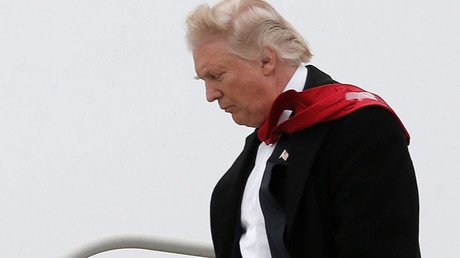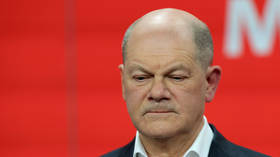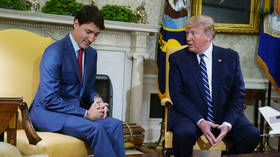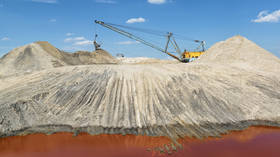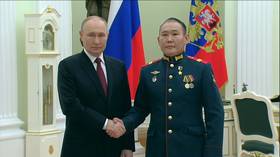Stick to ‘one China’ policy, Beijing tells US after historic call between Trump & Taiwan’s president
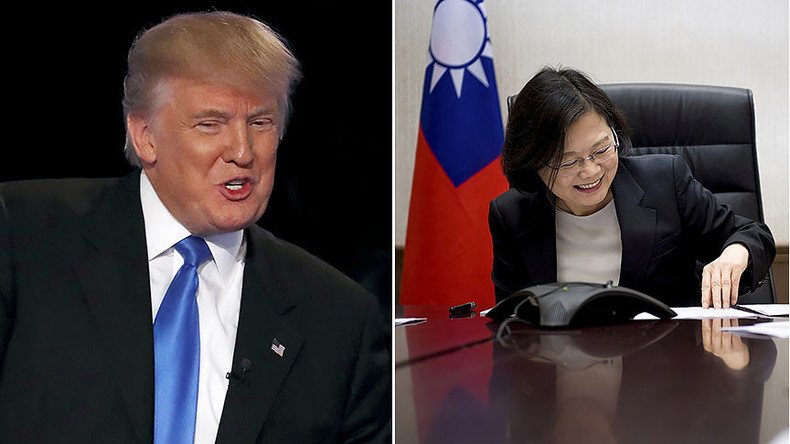
China has lodged a protest over Donald Trump’s conversation with Taiwan’s Tsai Ing-wen, the first between a US president or president-elect and a Taiwanese leader since 1979. Beijing urged the US to stick to the “one China” policy to avoid wrecking ties.
The “one China” principle is key to a healthy China-US relationship, China’s Foreign Ministry said on Saturday, while urging Washington to carefully handle the Taiwan issue, according to Reuters.
Earlier, Beijing called Trump’s conversation with the Taiwanese president much ado about nothing, “just a petty action” by Taipei.
“This is just the Taiwan side engaging in a petty action, and cannot change the ‘one China’ structure already formed by the international community,” Chinese Foreign Minister Wang Yi said at an academic forum on Saturday, Hong Kong-based Phoenix Television reported, according to Reuters.
Obama breaks w/decades of US policy on Cuba & gets endless fawning coverage. Trump breaks w/US policy by phoning Taiwan & he's reckless?
— Stephen Hayes (@stephenfhayes) 3 декабря 2016 г.
“I believe that it won’t change the longstanding one China policy of the United States government. The ‘one China’ principle is the cornerstone of the healthy development of Sino-US ties, and we hope this political basis is not interfered with or damaged in any way,” he added.
Trump and Tsai spoke over the phone for more than 10 minutes, discussing issues related to economic development and strengthening national defense, Focus Taiwan reported, citing the Presidential Office.
Tsai also reportedly voiced hope that Washington would lend Taipei “more participation and contributions on international issues.”
Obama borrows $500 billion from China in 8 years. Media is silent
— Charlie Kirk (@charliekirk11) 3 декабря 2016 г.
Trump takes a phone call from Taiwan & gets accused of damaging relations
A storm of opinion was unleased on social media after Trump announced on Twitter that he had received an unprecedented call from the Taiwanese president.
“Interesting how the US sells Taiwan billions of dollars of military equipment, but I should not accept a congratulatory call,” Trump noted in another tweet.
People are mad at Trump for taking that Taiwan call, but I'm impressed that a dude with that much debt answers the phone at all
— Peter Schultz (@pete_schultz) 3 декабря 2016 г.
I'll take President-Elect Trump's "Thank you" call from #Taiwan over Obama's "I'm sorry, here's money" call to Iran ANY DAY OF THE WEEK!
— Scott Presler VA (@ScottPresler) 3 декабря 2016 г.
If you wonder why foreign policy Twitter isn't hauling out precedents for Trump's Taiwan call, it's because this idiocy is unprecedented.
— Paul Musgrave (@profmusgrave) 3 декабря 2016 г.
48 hrs. of Donald Trump. Going to visit Pakistan, invite Duterte to Washington and spoke with Taiwan. No advisors or grasp of foreign policy
— ♻️ Christopher Zullo (@ChrisJZullo) 3 декабря 2016 г.
Trump is “well aware” of what US policy has been on Taiwan, his spokesperson Kellyanne Conway said on Saturday.
“President-elect Trump is fully briefed and fully knowledgeable about these issues on an ongoing basis, regardless of who is on the other end of the phone,” Conway told CNN.
Beijing is extremely suspicious of Tsai, believing that Taiwan’s first female president is eager to push for the island’s formal independence. Tsai has advocated “maintaining the status quo” with China, pledging to do her best to “seek methods of exchanges acceptable to both sides of the Taiwan Strait,” Taiwan News reported.
The United States and Taiwan enjoy a “robust relationship,” the State Department says. Although Washington does not support Taiwan’s independence, maintaining “strong, unofficial relations” with the island nation appears to be a “major US goal.”
In 1979, under President Jimmy Carter, the US switched its diplomatic recognition of China from Taipei to Beijing in a joint communique issued by America and the People’s Republic of China, acknowledging “the Chinese position that there is but one China and Taiwan is part of China.”
The United States has nonetheless maintained commercial ties with Taiwan for nearly four decades. Taiwan is the US’ ninth largest trading partner, and the United States is Taiwan’s second largest, the State Department says.
The question of Taiwanese independence is one of China’s most touchy policy issues. China considers the small island 110 miles (80 kilometers) off its southeastern coast to be a renegade province, and any official contacts between foreign governments and Taiwan’s leaders immediately come under fire from Beijing.
Last year, when the Obama administration sold $1.83 billion worth of defensive weapons to Taipei, China hit back, threatening to impose sanctions against the companies involved in the arms sale. Afterwards, the White House rushed to acknowledge that there had been no shift from its longstanding “one China” policy.
